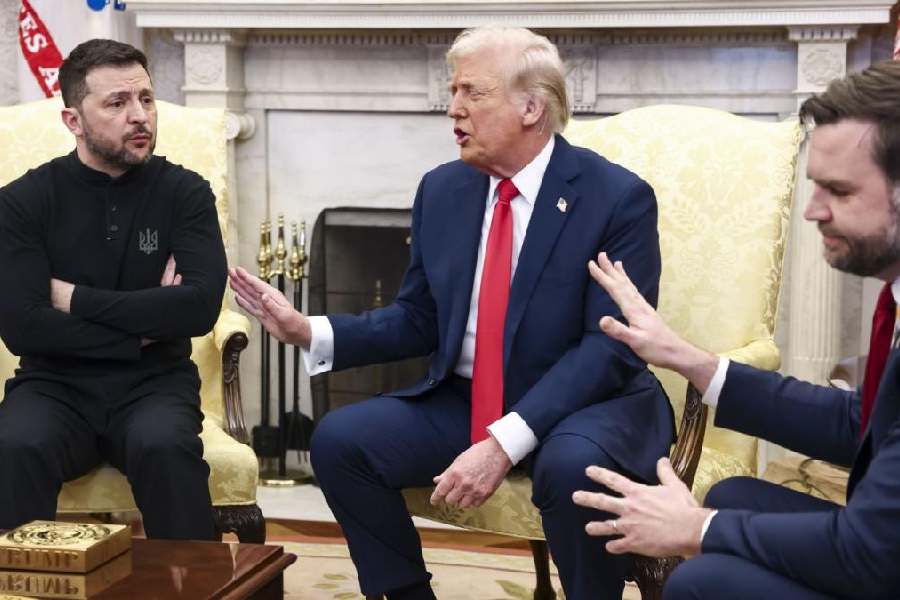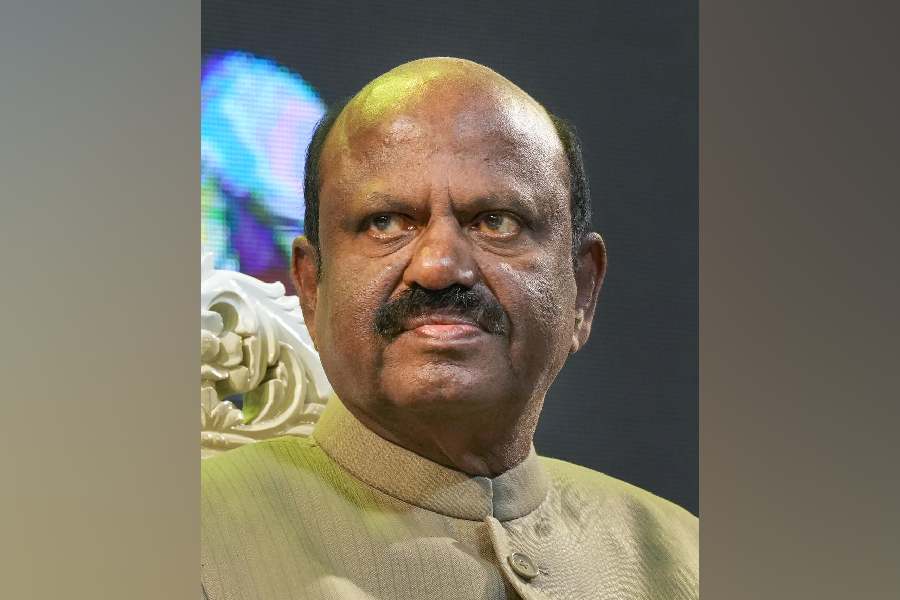The diplomatic missteps of Volodymyr Zelensky can be left to the expertise of foreign affairs pundits but as political theatre, the public spat between Zelensky and Donald Trump (with J.D. Vance in close attendance) tells us something about the court rituals of the New American Empire.
Earlier visits by Emmanuel Macron and Keir Starmer had given us an inkling about how these tributary exchanges are meant to go. Macron and Starmer flattered and simpered. Starmer massaged Trump’s ego and his arm, then pulled out a letter from King Charles III inviting Trump to Britain for an ‘unprecedented’ second State visit. Trump rewarded Starmer by saying that his wife was a very beautiful woman, that Starmer had a wonderful accent, and that he was likely to green-light Starmer’s agreement with Mauritius about the ‘return’ of the Chagos Islands.
It tells you how completely Trump has buffaloed the British press that no one thought to mention that it was unusual and creepy for a head of State to publicly comment on the attractiveness of a visiting politician’s wife. It’s as if the end of ‘wokeness’ has let the West regress to a Mad Men world where the likes of Trump can refer to women in any way they want. Besides, Starmer has an adenoidal accent that he once employed a voice coach to correct, so Trump is either tone-deaf or was being nice to Starmer in the one currency he values: flattery.
The post-mortems on Macron’s and Starmer’s visits read like analyses of early-nineteenth-century visits by Western ambassadors to the Qing court: how low they kowtowed, how their gifts were received, whether or not the emperor granted their petitions. Even Kremlinologists didn’t invest Leonid Brezhnev’s beetling brows with the significance that the White House press corps read into Trump’s body language on these occasions.
It was clear that Zelensky, even more than Macron and Starmer, had been cast in the role of supplicant. Trump, in his capacity as imperial peacemaker, had praised Vladimir Putin’s willingness to end the war, demanded elections in Ukraine to produce a legitimate leader, and denounced Zelensky as a dictator. He then walked the ‘dictator’ description back and decided to impose an imperial peace on Ukraine. This consisted of a ‘minerals deal’, which amounted to an expropriation of half of Ukraine’s mineral and energy resources, plus a controlling interest in its ports. Trump spun this as an implicit security guarantee because the presence of US companies and personnel in Ukraine, he claimed, would deter Putin from future aggression.
A ceasefire in Ukraine is a rational goal for a US administration. There is no cast-iron case for an open-ended military commitment to a war that Ukraine can’t win. After years of war, it’s no closer to regaining its occupied territories. Joe Biden armed Zelensky’s army but he also withheld planes and munitions that he felt might provoke nuclear Russia into a larger war against NATO and Europe. So it’s reasonable for Trump to push for a ceasefire though Western pundits have criticised his tilt towards Russia as a preliminary to ending the war.
But it’s one thing to resist Zelensky’s maximalist military goal (ejecting the Russians from every inch of Ukraine’s territory), and quite another to take advantage of Ukraine’s duress to reduce it to economic vassalage by forcing it to accept a near-permanent US lien on its extractable resources. Having initially rejected the ‘deal’, Zelensky had arrived in King Donald’s court, cap in hand, prepared to sign it in return for some sort of security guarantee from the United States of America without which his cause was lost.
The so-called ‘minerals deal’ should be understood as part of the imperial Trumpian plan to re-order the world with the help of new tariffs and territories. Annexing Canada as the 51st state, annexing Greenland, period, taking over the Panama Canal, threatening military action at the Mexican border and leeching Ukraine of its rare earths and minerals, ostensibly as payback for US military supplies, are Trump’s way of asserting imperial control over allies that he sees as freeloading client states.
Trump’s apologists blame his critics for taking him literally and not seriously. This rhetorical trick serves two ideological purposes. It produces alibis for plainly offensive declarations like the infamous ban on Muslim immigration or the mooted annexation of Canada; these can, when convenient, be reframed as clever provocations. It also earns Trump a reputation for plain-speaking and pragmatism: the deal-maker trying to end the Ukraine war, the peacemaker trying to move on from the endless war in Gaza by thinking out of the box: relocating its population and turning it into the Riviera.
Ukraine is so dependent on the US for weapons and materiel that Zelensky had, in principle, agreed to “… bargain away his nation’s birthright” in the words of Andrey Kurkov, a Ukrainian novelist, when Vance intervened to teach him the superiority of diplomacy over war. Zelensky made the mistake of arguing with his betters, and Vance and Trump then schooled him about the need to be grateful and thankful to his US patron.
It made for great television, as Trump himself pointed out, this spectacle of Zelensky trying to fight his corner in a language he wasn’t comfortable in and Trump and Vance teaming up to publicly humiliate the Ukrainian president for not knowing his place. Some might even say that there was an openness, a transparency, to this Godfather-like demand for gratitude and respect that was preferable to the opacity of the previous administration where Biden’s pieties about the liberal international order were at such odds with his actual actions in Ukraine and Gaza. As an Indian, inured to a prime minister who never holds a press conference unless he is forced to in foreign parts, Trump’s willingness to take questions at the risk of embarrassing himself and others is refreshing.
That said, it’s hard to believe that making subordinate allies and clients like Britain, France and Ukraine tiptoe performatively around a hectoring and unpredictable president is a winning global strategy for the US. I can’t see the leaders of substantial, self-respecting states allowing themselves to be put in Zelensky’s position. There is a reason why Narendra Modi and Xi Jinping speak through translators: it keeps them from being ambushed, buys them time, and allows much to be lost in translation.
Much was made of Zelensky disrespecting the US by disagreeing publicly with Trump in the White House. This was, in part, Trump’s fault. If the White House was meant to be the theatrical backdrop for Trump’s power and Zelensky’s submission, there was something absurd about the setting. Trump sat low in his armchair, so low that he seemed to be half-squatting. Vance and Marco Rubio sat to a side. Trump hunched and glowered when Zelensky flubbed his lines, Vance jumped in to scold and heckle. There was an absence of decorum (and the gravitas that decorum brings), which helped turn the proceedings into farce. When Vance lectured Zelensky on the importance of diplomacy, irony died.
mukulkesavan@hotmail.com











